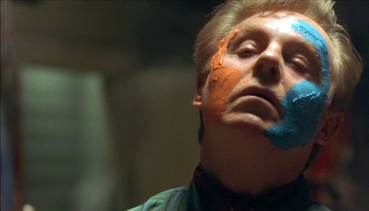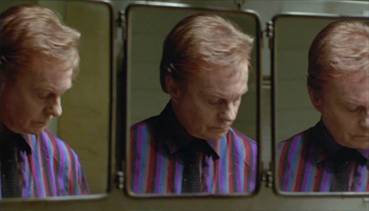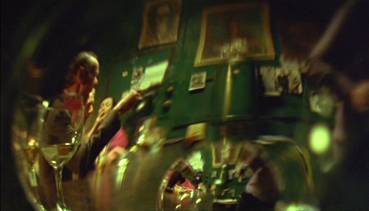Reacquainting
myself with this film for the purposes of this review, I
remembered how great Love is the Devil, Study for
a Portrait of Francis Bacon (to give it its full
title) is. It is a biography of British abstract artist
Francis Bacon during arguably his greatest period, the 1960s-70s,
that happened to be the same period George Dyer was his
lover. Dyer (Daniel Craig) encountered Bacon (Derek Jacobi)
when botching a robbery in the artist's studio. They were
instantly attracted to each other, even though they came
from very different backgrounds. Plot wise, that's
about it, but director and writer John Maybury forges a
rare character driven film that does not sacrifice aesthetic
emphasis.
Bio-pics
are notoriously hard things to pull off successfully, and
when it comes to such a movie about an artist, it becomes
even more difficult to navigate a well known person's life,
reflect their work and tell an absorbing story without losing
your audience. Obviously in a story about a renowned artist,
separating the person from the work is impossible, but what
is really important is the level of insight into the personality
that has informed the work. Julie Taymor's Frida (2002), is one example of a movie that overplays the merging
of an artist and her work in film form. And one could argue
Ed Harris's Pollock (2000), although
an absorbing biography, did lack some of the artistic flare
that the mise en scene could have provided. John Maybury,
however, tackles this marriage with a contrast between subtlety
and the occasional avant-garde set up. It practically wholly
translates Bacon's painting into the medium of film
and is so expertly handled the transitions from a naturalistic
reality to the abstract are seamless.
The
only fully worthy comparison to this is Naked
Lunch (1991) by David Cronenberg. It similarly
marries the ideas and the mental workings that structured
the writer, William S Burroughs' work with an autobiographical
narrative. The main difference is that the plot, being interwoven
with parts of the Naked Lunch novel, is
actually a part of his art. Love is the Devil
follows a more traditional biographical narrative, yet manages
to achieve an equal essence of a man's work, although the
Cronenberg piece is so heavily thematic it stands more of
a chance of losing ian audience of non avid Burroughs fans.

How
Maybury manages to make his such an absorbing film is by
throwing it, kicking and screaming, into the genre of a
love story, similarly to another of our fine exports, Alex
Cox's bio-pic Sid and Nancy (1986). In
both narratives the catalyst and foundation of interest
is in the bringing together of two quite different people,
although they have something in common to bond them. In
Sid and Nancy it is their love of the punk
movement and its ideology that keeps the protagonists together.
In Love is the Devil it is Bacon and Dyer's
shared homosexuality that bridges the gap between class
and intellect. One could say it is 'love' in both of these
cases keeping these characters together, but an intelligent
reading of either film leads one to the conclusion that
their motives are a lot more complex than that. With Love
is the Devil it's all in the title. The concept
of love in this film is not the same as you would find in
a mainstream film. Here love is something that imprisons
you. Something stifling and claustrophobic. Something complex
and sometimes horrific. 'Love' scenes take place in dark
oppressive rooms, the act of sex often shown as an abstract
grapple, a purely physical act. Jacobi quips in one of the
delightfully skewed drunken scenes at the Colony, when asked
if he shows his feelings in his work; "Feelings?! Feelings?
I prefer to show two men fucking!" perfectly echoing
the unsentimental and primitive attitude connoted in the
blurred and objective sex scenes. The act is rendered impersonal
by the framing of shots showing no faces, no distinguishable
traces of feeling, just the act.
Essentially
the film is a filmic rendering of Bacon and Dyer's psyches
shown through a complex weaving of cross-examinations and
contrasts with their relationship as the catalyst. Bacon
is a mass of contradiction and confusion posing as self
confidence, taking out his anxieties on the less intelligent
Dyer. George was an unhappy man on meeting Bacon, forced
into a life of petty crime by circumstance, yet the relationship
brought out his demons. What you have in this film is two
men struggling for coherence, trying to make sense of their
world. A world where distinctions between pleasure and pain,
ugliness and beauty, class systems and sexuality, are blurred.
The macho Dyer wants tenderness, the camp Francis gives
him cruelty. One is ying to the others yang. George; the
muse, the emotionally submissive but sexually dominant,
the 'boy', Francis; the artist, a sexual masochist and emotional
sadist.
This
confusion and questioning of the nature of love and life
is all set to the colour palette of Bacon's works. Emphasis,
as was Bacon's, on the portrait. Abstracted using myriad
resourceful techniques, the most notable of which being
the Colony scenes shot through the distortion and point
of view of cocktail glasses. Imagery connoting intoxication,
desolation, loneliness, disorientation. Bacon alone in portrait
shots framed rectangularly, like a canvas, by foreground
images. Bacon alone in his studio. George alone in the hotel
room. All these scenes are so indicative of the solitary
figures painted on Bacons canvases. Even the triptychs and
Bacons fascination with reflection are connoted by a three
piece shaving mirror both George and Francis stare into
as well as numerous lingering solitary reflections. If you're
looking for exact translation, look no further than Bacon
turning the light bulb on and off looking into a mirror,
an exact replica of one of his paintings of the period.

I
have always thought of John Maybury as a man who draws from
more diverse influences than many modern filmmakers, with
his background in the avant-garde and projects with the
likes of Leigh Bowery. Therefore it's no surprise
that he includes rather a lot of Bacons fascination with
Eisenstein, showing him viewing the Odessa Steps sequence
in Battleship Potemkin etc. Although personally
there is one influence indulged in that is closer to my
heart.
As
previously mentioned, Love is the Devil
has comparisons with the Naked
Lunch film in its tackling of a biographical
topic. Although, this is not the only area where these two
converge. Bacon speaks of Tangiers briefly in the film,
where both he and William Burroughs frequented during the
1960s (as did many homosexual and bohemian artists of the
time). Also, there is a reference where George speaks on
the telephone to a "Dr Benway,"
a famous Burroughs character. This cements the connection
as an intended facet of influence by Maybury, saying how
universal the troubled mind of the 1960's artist seemed
to be, as well as how influential they were on each other,
injecting as subtle a homage to the American avant-garde
as one might expect from a man of Mayburys background. Benway
is also a character of dark mystery in Burroughs writings,
a theme that shrouds existence within the diegesis of the
entire film.
Before
I take this review into unnecessary pastures I will speak
briefly on sound and wrap it up!
Ryuichi
Sakamoto's score is wonderfully in keeping with the
atmosphere. There are horror-esque orchestral discordant
rips when an abstract Baconism (yes I know, well it's a
word now!) is realised, beautifully understated keyboards
in more tender moments and nothing to jar you out of the
world Maybury weaves around you. Nauseating pulses undulate
beneath inhumane noises on the occasion an avant-garde sequence
is in order, or sympathetic notes trickle under a scene
of sadness. In my opinion Sakamoto does the job of a good
screen composer and is hardly noticed.The
anamorphically enhanced 1.78:1 transfer is a little on the
bright side, giving the picture a deceptively washed-out
look that is easily corrected simply by edging the brightness
on your TV down a little. With this correction effected
the picture quality is often first rate, if occasionally
a little uneven, with contrast, detail and black levels
fine on daytime exteriors, but greying out a little on darker
interiors. There are also some visible compression artefacts
in some of these scenes on areas of single colour (walls,
etc.). Colours in daylight scenes are strong, with the more
stylised greens at The Colony acurately captured. On the
whole, this is a fine transfer that for the most part accurately
reflects how the film looked in the cinema.

The
soundtrack is Dolby 2.0 stereo. Clarity is excellent and
the separation is very good, notably on the music and sound
effects.
A
disappointingly sparse collection of extras include Production
Notes, basically a magazine style article
with Maybury, Jacobi and Craig talking about the film and
their approaches to it. A Theatrical Trailer
which shows a target audience strongly geared towards independent
and arthouse, with much of the abstract imagery. It is interesting,
although the poor picture quality of this trailer it highlights
just how good the feature print is. Finally, there are Filmographies,
detailing what projects the writer/director and main cast
have been involved in via two or three paragraph summaries.
Unfortunately, that's all folks!
A
remarkable and intelligent piece of independent filmmaking,
showing John Maybury is much more than just Derek Jarman's
ex-apprentice. With last year's The
Jacket and Daniel Craig's up and coming Bond
film in the pipeline, this is a timely release for Love
is the Devil on DVD. I'm just disappointed the
dismal amount of features don't do the film and its excellent
transfer justice.
|